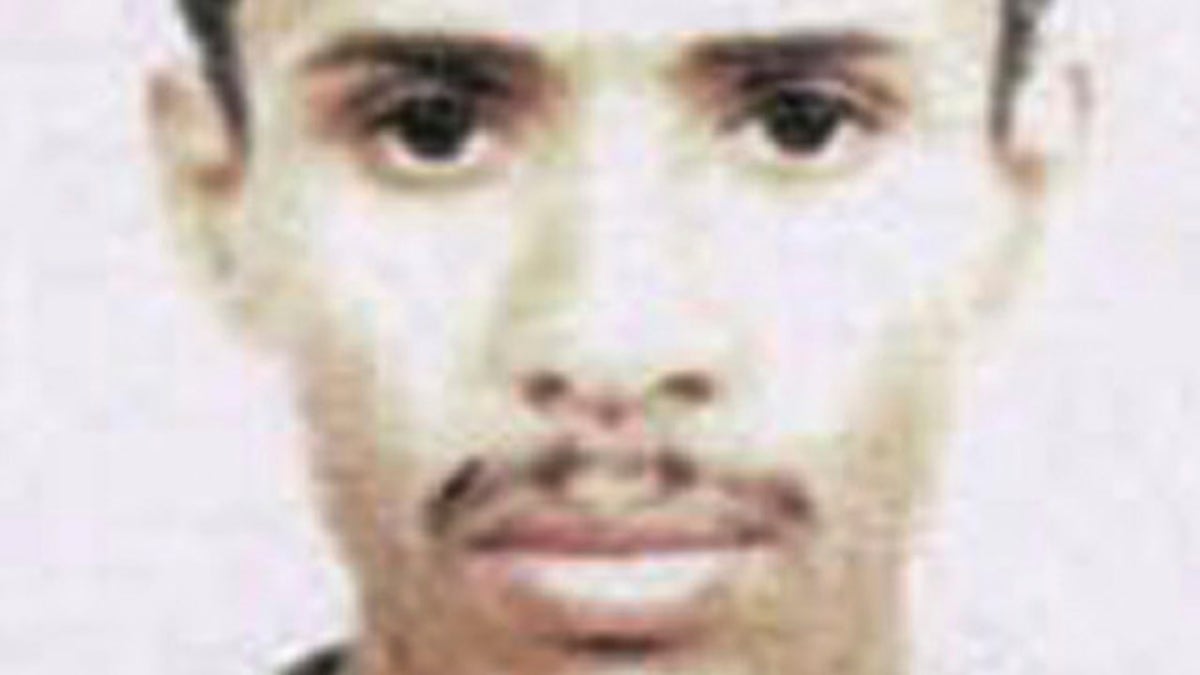
FILE: Fahd al-Quso was charged as an Al Qaeda member who helped to plan the attack on the USS Cole that killed 17 American sailors in 2000. (AP)
SANAA, Yemen – An airstrike Sunday killed a top Al Qaeda leader on the FBI's most wanted list for his role in the 2000 bombing of the USS Cole warship, Yemeni officials said. The drone attack was carried out by the CIA, U.S. officials said.
Fahd al-Quso was hit by a missile as he stepped out of his vehicle, along with another Al Qaeda operative in the southern Shabwa province, Yemeni military officials said. They were speaking on condition of anonymity in accordance with military regulations.
The drone strike that killed Quso was carried out by the CIA, after an extended surveillance operation by the CIA and U.S. military, two U.S. officials said. They spoke on condition of anonymity because they were not authorized to speak to the media.
The strike was authorized by the Yemeni government, which then made the announcement after the operation was complete, the officials said, part of the U.S. strategy to give the host government more public ownership of the operation being carried out on Yemeni soil.
The airstrike came as the U.S. and Yemen cooperate in a battle against Al Qaeda in southern Yemen.
Al-Quso, 37, was on the FBI's most wanted list, with a $5 million reward for information leading to his capture. He was indicted in the U.S. for his role in the 2000 bombing of the USS Cole in the harbor of Aden, Yemen, in which 17 American sailors were killed and 39 injured.
He served more than five years in a Yemeni prison for his role in the attack and was released in 2007. He briefly escaped prison in 2003 but later turned himself in to serve the rest of his sentence.
A telephone text message claiming to be from Al Qaeda's media arm confirmed al-Quso was killed in the strike.
Al-Quso was also one of the most senior Al Qaeda leaders publicly linked to the 2009 Christmas airliner attack. He allegedly met with the suspected Nigerian bomber, Umar Farouk Abdulmutallab, in Yemen before he left on his way to execute his failed attack over Detroit with a bomb concealed in his underwear.
In December 2010, al-Quso was designated a global terrorist by the State Department, an indication that his role in Al Qaeda's Yemen offshoot, Al Qaeda in the Arabian Peninsula, had grown more prominent.
Local Yemeni official Abu Bakr bin Farid and the Yemeni Embassy in Washington confirmed al-Quso was killed in Rafd, a remote mountain valley in Shabwa. It is the area where many Al Qaeda leaders are believed to have taken cover, including the U.S.-born cleric Anwar al-Awlaki, who was killed in a U.S. airstrike in Yemen last year.
Yemeni government officials reported that al-Quso and al-Awlaki were killed in an airstrike in 2009 in Rafd, but they both resurfaced alive.
Al-Quso was known for his ability to move in disguise. He was from the same tribe as al-Awlaki, and local tribesmen said he was a close aide. He studied ultraconservative Salafi Islam as a teenager in northern Yemen, then returned home to learn welding.
The White House and the State Department had no immediate comment.
Yemen's government has been waging an offensive on Al Qaeda militants, who have taken advantage of the country's political turmoil over the last year to expand their hold in the south.
The new Yemeni president has promised improved cooperation with the U.S. to combat the militants. On Saturday, he said the fight against Al Qaeda is in its early stages.
Al-Quso's association with Al Qaeda dated back more than a decade, when he met with Osama bin Laden in Afghanistan. Bin Laden allegedly told him to "eliminate the infidels from the Arabian Peninsula."
From there he rose through the ranks. He was assigned in Aden to videotape the 1998 suicide bombing of the USS Cole, but he fell asleep.
Despite the lapse, the local leader, Nasser al-Wahishi, declared him the regional leader in Aden. He was also believed to have played a prominent role in Al Qaeda's attack and capture last year of Zinjibar, the capital of Abyan province.
Government troops are trying to drive Al Qaeda out of Zinjibar.
